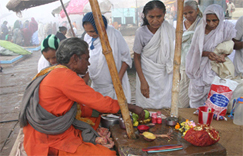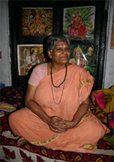
Interview with...
Widow
. Kashi is a city that attracts widows from all over India because it is their last refuge. In the month of Karttika (November), to honour their husbands, they light up small lamps in wicker baskets, which are held on top of bamboo poles. These lamps light up the sky with a sad gleam. Sometimes they live in houses reserved to them: the vidhwa ashrams.
. In the ancient tradition, women did not have the right to outlive their husbands. They had to immolate themselves on the husband’s pyre. This practice called “Sati” was prohibited during the British rule in 1829.
. Even nowadays, they are rejected by their family-in-law, by their own family. They have no resources and still have to bear a reputation of bringing bad luck. The Indian widow dresses in white, wanders in the lanes and on the ghats waiting for their future liberation (moksha).
. Minakshi is one of them. She relates us her life.


